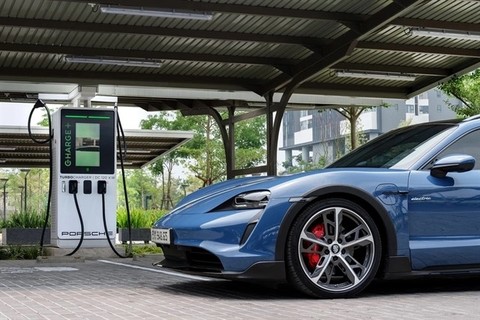
A Porsche charging station in HCM City. — Photo courtesy of the company
The development of electric vehicles (EVs) in the Vietnamese market has shown significant progress in recent years. The first introduction of the BMW i3 in 2016 marked a notable milestone, considering the dominance of gasoline and diesel vehicles in Việt Nam at that time. This early entry generated curiosity and attention among the public, according to industry insiders.
VinFast's entrance into the EV market with the VF e34 in October 2021 was a pivotal moment. Subsequently, VinFast made a strategic decision to focus exclusively on electric vehicles, signaling a shift in the Vietnamese auto industry towards sustainable mobility. This move not only diversified VinFast's product line with various electric SUV models but also catalysed broader interest from other international automakers like Hyundai, Audi, BMW, Mercedes-Benz, Porsche and Volvo, among others.
One of the critical challenges facing the EV market in Việt Nam is the infrastructure for charging stations. Unlike traditional refueling at gas stations, charging an electric vehicle requires more time, which initially posed a barrier for consumer adoption. VinFast has acknowledged this challenge and announced plans to develop 40,000 charging ports across various locations nationwide. These stations are intended to be situated in apartments, rest stops, shopping centers, office buildings and parking lots, aiming to enhance convenience and accessibility for EV users throughout Việt Nam.
EV charging infrastructure in Việt Nam has seen substantial development, driven by efforts from VinFast and other automotive giants like Porsche and Audi.
Meanwhile, Porsche, in collaboration with Charge+, has also announced plans to deploy a DC fast charging network in Việt Nam.
This initiative will add 17 new fast charging locations over the next three years. These stations, offering up to 180kW capacity, are strategically located in major cities like Hà Nội, HCM City and Đà Nẵng, as well as in key mid-trip stops including Ninh Bình, Phan Thiết and Bảo Lộc. This expansion aims to enhance the convenience and reliability of charging for Porsche and potentially other EV users, contributing to the broader infrastructure development in Southeast Asia.
German automaker Audi has also made strides in EV infrastructure within Việt Nam, operating three DC fast charging stations in HCM City. These stations are strategically positioned at service centers and showroom locations across the city, ensuring Audi customers have reliable access to fast charging options.
The rapid expansion of VinFast and the increasing presence of EV models from various manufacturers reflect a growing momentum towards electric mobility in Việt Nam. As infrastructure continues to develop and consumer awareness increases, the EV market is poised for further growth, contributing to sustainability efforts and reshaping the automotive industry landscape in the country.
Diversified EV charging options
EV charging infrastructure in Việt Nam is expanding not only through efforts from automotive manufacturers like VinFast, but also through various private entities operating shared charging stations.
Several private companies such as Eboost, EV One, EverCharge, EVN, DatCharge, Rabbit EVC and VuPhong Energy have been actively deploying shared charging stations across Việt Nam. These providers aim to fill gaps in charging infrastructure and offer convenient access to charging for EV owners, regardless of the car brand they own.
VinFast, while leading in the country's EV market, has opted not to share its proprietary charging network with other car manufacturers like BYD (models Atto 3, Dolphin and Seal) and MG (specifically mentioned with the MG4 EV). Despite BYD's models supporting the CCS2 charging standard, which is compatible with VinFast's infrastructure, there is currently no interoperability between these networks. Owners of BYD and MG EVs must rely on third-party charging stations operated by providers like EV One, which are expanding their networks across the country.
Looking forward, the Vietnamese EV market's growth will likely influence strategic decisions regarding charging infrastructure. As the market matures and competition intensifies, there could be shifts towards more open networks or interoperability agreements between manufacturers and charging providers. VinFast's decision to potentially expand its charging network to serve multiple car brands in the future indicates a recognition of the evolving needs and preferences of EV customers in Việt Nam. — VNS